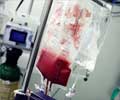The US Food and Drug Administration (FDA) has declared that the life-time ban on donation of blood by gay men will stay, at least for now. Thus it has turned down pleas by associations like the Red Cross and AABB (formerly known as the American Association of Blood Banks) to reverse the ban in view of the serious shortage of blood in the country.
The agency argues that current HIV testing cannot always pick up right away when someone is HIV positive. It said on its website, “The ‘window period’ exists very early after infection, where even current HIV testing methods cannot detect all infections. During this time, a person is infected with HIV, but may not have made enough virus or developed enough antibodies to be detected by available tests. For this reason, a person could test negative, even when they are actually HIV positive and infectious.”However, it would change this policy if supported by scientific data showing that a change in policy would not present a significant and preventable risk to blood recipients. The Food and Drug Administration’s ban of 1983 prevents an estimated 62,300 gay and bisexual men from donating blood. Blood collection organisations say the “window period” risks have been negated by modern blood tests, which “can detect HIV positive donors within just ten to twentyone dyas of infection.
They had suggested a “one-year deferral following male-to-male sexual contact,” to minimize risks. But the FDA would not buy into such compromises. The ban applies to any man who has ever had sex with another man, even as far back as 1977. With terrible accidents happening all the time all over the country, there is a dire need for storing enough blood, critics say.
Blood shortages are not going away anytime soon. The members of the Greatest Generation, those now entering their late 70s and 80s, have been this nation’s most reliable blood donors. They are dying off. Younger people are not as committed to donating blood. Yet the demand for blood increases everyday.
Americans undergo more bypass operations, organ transplants, C-sections, hip and joint replacements, and other treatments every year. All require the use of blood. And as more and more people live with immune disorders or diseases that hamper their ability to make blood, the demand for blood also escalates.
“Letting gay men give blood could help bolster the supply. But, incredibly, despite ongoing shortages of blood that can and do cost lives, and no artificial substitute on the horizon, the FDA is letting prejudice and fear — not science — determine whether gays can give blood,” regrets Arthur Caplan.
Advertisement
But the right response is to exclude anyone who has engaged in any risky sexual or drug behavior for, say, a month prior to donating blood — not those who had sex with a man 30 years ago! Currently the odds of getting HIV from a blood transfusion are about 1 per 2-million people in the United States. The FDA has acknowledged the accuracy of the tests, but also stresses that they are not at 100%.
Advertisement
Source-Medindia
GPL/V










